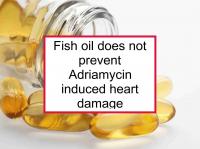Doxorubicin, an anthracycline chemotherapy drug, plays a crucial role in the treatment of breast cancer. However, doxorubicin can cause cardiomyopathy, damage to the heart muscle that weakens its ability to pump. Symptoms of cardiomyopathy can become apparent during chemotherapy, shortly afterwards, or years later.
The damage can resolve quickly or be so severe as to cause death. At the moment, there is no treatment that can reverse the damage. Rates of chemotherapy-induced cardiomyopathy have variously been estimated at 2% to 15%. Doxorubicin is the best known breast cancer drug that induces cardiomyopathy, however epirubicin, 5-FU, platinum-based chemotherapy drugs such as cisplatin, as well as trastuzumab (Herceptin), can also cause heart damage.
Fish oil has been proposed to reduce risk of cardiomyopathy
Omega-3 fatty acids such as those found in fatty fish (e.g., salmon, sardines, and mackerel) have been found to be cardioprotective, reducing symptoms of heart failure in patients with traditional cardiovascular disease.
Several researchers have suggested that fish oil might have a role in protecting cancer patients from doxorubicin-induced cardiomyopathy. However, recent research suggests that fish oil supplements should not be used by those undergoing chemotherapy. This is because some fish oil preparations contain fatty acids that can induce resistance to a broad spectrum of chemotherapy drugs in minute quantities. Now, a new study has reported that fish oil might actually increase the risk of doxorubicin-induced cardiomyopathy.
Latest research finds fish oil could increase cardiomyopathy
The study referenced at the beginning of this news article was designed to investigate the effects of fish oil supplementation in an animal model of doxorubicin-induced cardiomyopathy. Previous studies have investigated the potential cardioprotective effects of omega-3 polyunsaturated fatty acids (PUFAs) in rodent and cell models of anthracycline toxicity, with conflicting results.
In the study, merino sheep were divided into two groups and given either fish oil (eight sheep) or olive oil (placebo; nine sheep) starting three weeks before undergoing repeated administrations of doxorubicin directly to the heart. The fish or olive oil was continued for 12 weeks after the final doxorubicin treatment. The sheep given fish oil were found to have significant increases in tissue levels of omega-3 PUFA.
The fish oil-treated sheep displayed greater signs of anthracycline cardiotoxicity than placebo sheep. The damage took the form of left ventricular dilatation and a greater decline in ejection fraction. On the other hand, the degree of myocardial fibrosis was similar in both groups of sheep.
The authors conclude that dietary intake of omega-3 fats fails to prevent and might in fact exacerbate doxorubicin-induced cardiotoxicity. Use of omega-3 supplementation during chemotherapy should be deferred until more information is available regarding the interaction between fatty acids and the heart during anthracycline exposure.
Please see our article on breast cancer diet during doxorubicin chemotherapy for more information on diet during doxorubicin chemotherapy.
